Usually, when a rabbit feels stressed or frightened, it will have physiological effects, causing the body to produce some adverse reactions, which may occur quickly or slowly, and the consequences may be mild or severe, but they should not be underestimated. When frightened severely, there will be an intuitive and rapid extreme reaction, which is stress.
[Rabbits are timid and the consequences of stress are serious] This previous article talked about the causes of stress in rabbits and the impact on their bodies. This article will describe the behavior of rabbits when they feel stressed, as well as some intuitive stress reactions; at the same time, we will share some steps that scrappers can take to help rabbits reduce daily stress and relieve stress.
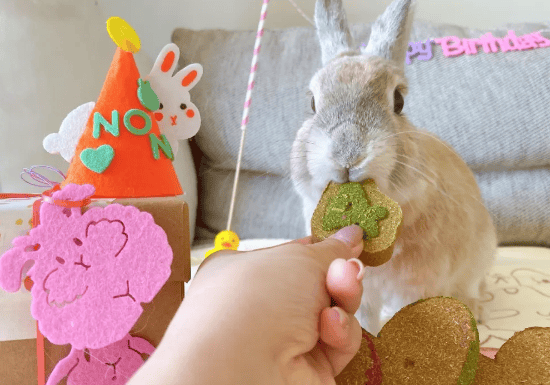
Table of Contents
1 Signs of Stress
2 Manifestations of Stress
3 Preventive Measures
4 Countermeasures after Stress
1 Signs of Daily Stress
Bunny Comfortable Sleeping on the ground
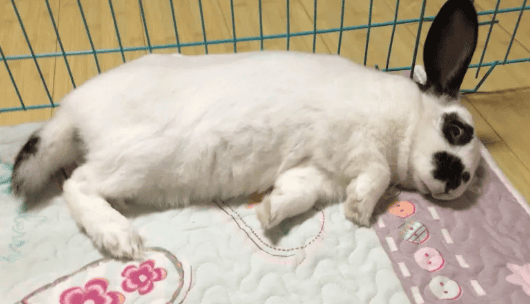
The following behaviors are not absolutely due to stress (there are other situations such as estrus). Therefore, it is necessary to judge based on the current situation. But usually if there are two or more signs, the rabbit is probably under stress and anxiety and needs help to relieve and improve it.
01 Prick up your ears alertly
Although the rabbit has a strong sense of perception and occasionally becomes alert, if it has been alert for a long time, its ears will stand straight and stiff, and at the same time They may lean forward as if listening, indicating that they have been feeling insecure and under great pressure.
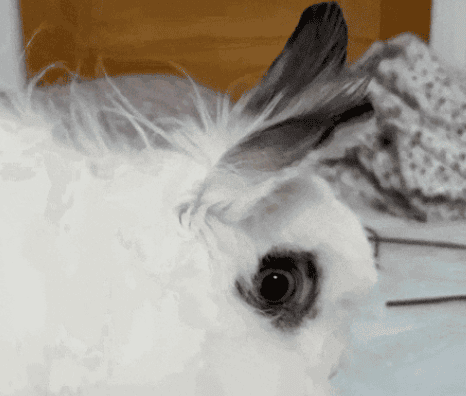
02 Escape or hide
Fear is the main reason why rabbits are in a state of long-term stress one of the reasons. When rabbits feel scared, they will run away and hide. The body will be in a tense state ready to escape at any time.
If you are anxious for a long time, your original time of daytime activities will turn into long periods of hiding. A stressed rabbit may immediately run away and hide from even common noises and objects.
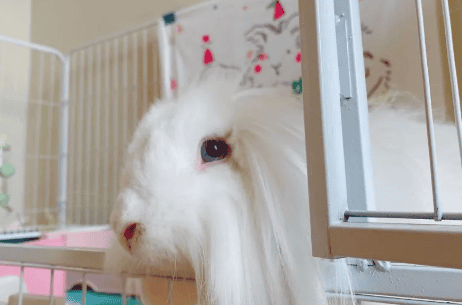
03 Often stomps its feet
When a rabbit senses danger nearby, it Will stamp their feet frantically to warn the family group that a threat is coming. The rabbit will stamp its feet repeatedly until it feels the danger is gone.
A rabbit that stamps its feet may be stressed because it often feels that it is in danger. But sometimes rabbits just thump and stomp to get your attention. Therefore, the rabbit’s behavior must be judged based on the current situation. [Poke: Is it fun for rabbits to stomp their feet? ]
04 Excessive licking/not licking at all
Highly stressed rabbits may groom themselves as a way of self-soothing. If your rabbit is constantly stressed, it may start to develop bald spots from excessive licking. (But prolonged licking during the shedding season is usually normal.)
Conversely, some stressed rabbits will stop licking themselves completely, causing their coats to become dull and more prone to hair loss. Dirty and tangled hair. Rabbits in an unclean environment are also more prone to anxiety, thus creating a vicious cycle.
05 Aggressive Behavior
Inexplicable aggressive behavior may also be due to stress or fear. Rabbits that are chronically stressed will develop a habit of attacking anything that comes close.
Example: Aggressive behavior of biting
06 Staying in one place for a long time
If the rabbit is not interested in the surrounding environment and just stays in one place all day, It's likely that you're stressed out and depressed. In addition, boredom, anxiety, and irritability can also occur when a rabbit does not have enough space, is kept in a small cage all day with nothing to do, or is not exposed to the outside world.
07 Persistent irritable/destructive behavior
Easily irritated, irritable (such as walking around in the cage or biting the bars) or persistent destructive behavior (such as not listening to advice) digging in the carpet or chewing on the floorboards), means the rabbit is stressed and may be frustrated and bored.
08 Changes in eating and toileting habits
Many rabbits will lose their appetite as long as they are a little stressed. A rabbit that doesn't eat well or eats less than usual may be due to stress. The digestive system of rabbits is very sensitive and needs to work continuously throughout the day. When rabbits stop eating, gastrointestinal obstruction will soon occur. If not detected and treated in time, it will be life-threatening.
Unusual bowel habits (such as poor bowel movements or constipation) may be a sign of anxiety. When a rabbit suddenly urinates in unexpected places, it may be due to stress for some reason, such as a new animal in the house.
09 Repetitive Behaviors
Anxious rabbits may engage in stereotyped movements that seem to have no purpose, such as biting a water bottle, circling, or shaking their heads. He is constantly hyperactive, running around but not resting.
2 Manifestations of Stress
Immunity is the body’s own defense mechanism. Immunity is a metaphysics that cannot be seen or touched. Young rabbits, older rabbits, and sick rabbits all have relatively low immunity.
Every time or long-term stress in rabbits may lead to decreased immunity. Rabbits have a very fast metabolism, and if their immunity drops to a certain level, they will become sick, and the disease will develop quickly.
The following are some serious and intuitive stress reactions (in no particular order). Immediate rescue measures are required.
01 Stiff posture
Generally, when rabbits are stressed, their bodies will become stiff. When you try to soothe it, the rabbit will not relax and enjoy the massage, and will remain stiff even when being stroked.
For example, when bathing a rabbit, its body seems to be very cooperative and motionless, allowing others to "slaughter" it. The whole rabbit is very stiff, but you can see that the rabbit's nose is twitching rapidly. In this case, the rabbit is already very stressed and is in a state of self-hypnosis and suspended animation. [Poke: Rabbit likes to sleep lying down? No! He could die from this! 】
02 Abnormal Breathing
When the rabbit's heartbeat speeds up and its breathing becomes rapid, its body can be seen moving up and down very obviously, and its nose is constantly twitching rapidly.
Heavy breathing and panting are unusual for rabbits. Rabbits can only breathe through the nose, so only in extreme cases will mouth breathing occur. Observe the twitching of the nose to judge the breathing speed. Normal rabbits usually inhale every 1-2 seconds (or faster after exercise). If the breathing is 3-4 times faster, it may mean that the rabbit is sick (such as heatstroke, cardiopulmonary disease, etc.) disease) or in intense fear.
03 Rampage
A rabbit that is suddenly frightened may seem to be irrationally furious, running away in all directions, and even unable to stop after hitting a wall or fence.
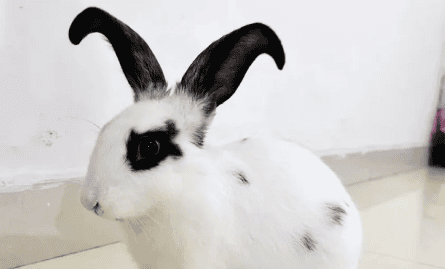
04 Make sounds
Make unusual sounds, such as screams Or loud grinding sounds of pain.
05 Abnormal expression
The body is frozen in place, the eyes are dull, the eyes are wide open, the eyeballs are bulging (the whites of the eyes are exposed), and the beard is stretched horizontally.
Eyes wide open
The whites of the eyes are protruding
06 is not in good spirits
The hen appears squatting with her ears stuck to her back. Huddle up in your hiding place. Not interested in the surrounding environment and food, not touching foreign objects and unwilling to be touched.
07 Obvious abnormality
No eating, no drinking, no excretion, abnormal defecation. Leg twitching, limb weakness, foaming at the mouth, diarrhea, etc.
3 Preventive Measures
01 Take precautions before they happen
Avoid some unnecessary dangerous operations, such as bathing; some situations can be prevented by training rabbits, Such as helping rabbits adapt to loud noises. Other situations require the owner to pay more attention. In addition, a medicine kit should always be kept at home. [Stamp: Rabbit Family Medical Kit]
Scenarios that may cause rabbit stress include but are not limited to:
Bathing or falling into water [Stamp: Do rabbits need a bath? 】
Chewing on wires can lead to electric shock
Moving [Poke: Moving with rabbits]
Other creatures, such as cats and dogs, other rabbits, strangers, and bears Children wait [Pot: Binding is a technical job]
Loud noises, such as holiday fireworks [Pot: How to comfort rabbits during fireworks? 】
02Keep quiet around rabbits
Avoid any sudden, loud noises. The specific situation varies from rabbit to rabbit. The owner can find out what sounds he is afraid of and his acceptance level, and then provide a quiet environment as much as possible.
03 Never force a rabbit to be picked up
When a rabbit is picked up by someone, it may break away frantically, trying to escape from the "predicament" quickly. For rabbits that are not allowed to be held, owners should not force them to avoid accidents (such as falling from a height when breaking free). [Poke: Why don’t rabbits like to be picked up often]
04 Don’t “round up” rabbits
Under normal circumstances, no matter when playing or something unexpected happens, try not to push the rabbit into a corner. , he will feel very scared if he has no way to escape. If someone at home wants to see the rabbit, you can let everyone take turns to see it. Don't have a group of people surrounding the rabbit all at once, otherwise the rabbit will have a fear of being rounded up. Also remember to tell them what to pay attention to when dealing with rabbits.
05 Reliable environment
Giving enough space and shelter facilities, the rabbit has enough time to socialize and exercise to ensure its health, otherwise it will suffer from Being unsatisfied leads to anxiety and depression. Also, keep your rabbit’s home at the right temperature.
06 Indoor environment is more suitable for domestic rabbits
In cold winter or hot summer, it is not recommended to take rabbits out to play. In addition, the neighbor's dog, the naughty child who does not understand etiquette, etc. may frighten and stress the rabbit. If the temperature is suitable, the location is quiet and there are no potential dangers, and remember to wear a leash when going for a walk.
07 Build trust
As Tutu’s “parents”, you have to be the person he trusts the most. Spend some time interacting and getting close to Bunny, letting him get used to your presence, and he will be able to live more peacefully at home.
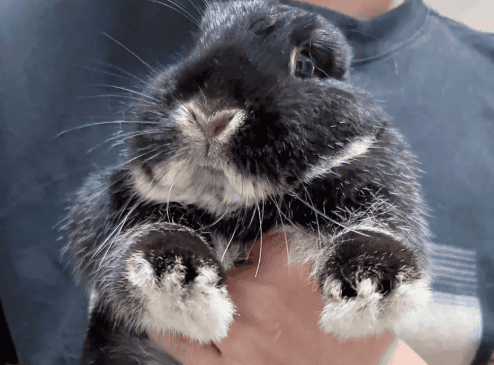
4 First aid methods for stress
When rabbits have stress symptoms, At present, owners can take the following methods to help rabbits survive the crisis.
But! Please seek medical advice if necessary. When the situation becomes serious, you should be sent to the hospital immediately without delaying first aid.
01 Immediately drive away/get rid of stressors
Look in all directions and listen in all directions to discover and deal with the source of stress in a timely manner. For example, take away the dog that scared the rabbit so that they are no longer in the same space; or rescue the rabbit that accidentally fell into the water, dry it immediately and keep it warm. In some cases, it may not be possible to keep your rabbit away from the source of the stress, such as a barking dog outside, and you may have to stay with and comfort your rabbit until the crisis passes.
02 Soothe the rabbit immediately
After getting out of danger, put the rabbit in a safe place, touch it gently and comfort it softly, and do not make big movements to hold or move it. You can then let it stay in a hiding place of your choice.
03 Diversion of attention
Give the rabbit the food he likes to comfort you, and at the same time help him forget the fear and vigilance just now. If you have an appetite, there is no problem.
04 Nutritional support
Depending on the situation, you can add some electrolytes to the water and supplement some probiotics in the next few days.
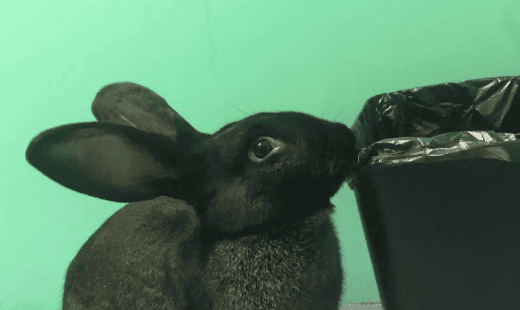
05Continue to pay attention to the rabbit's behavior
Even if the rabbit has calmed down, Keep an eye on her to make sure everything is okay. If possible, in the next few hours to days, observe whether the rabbit's eating and toileting conditions are abnormal compared with usual, and check whether the rabbit has digestive system problems due to fear and anxiety.

 扫一扫微信交流
扫一扫微信交流
发布评论